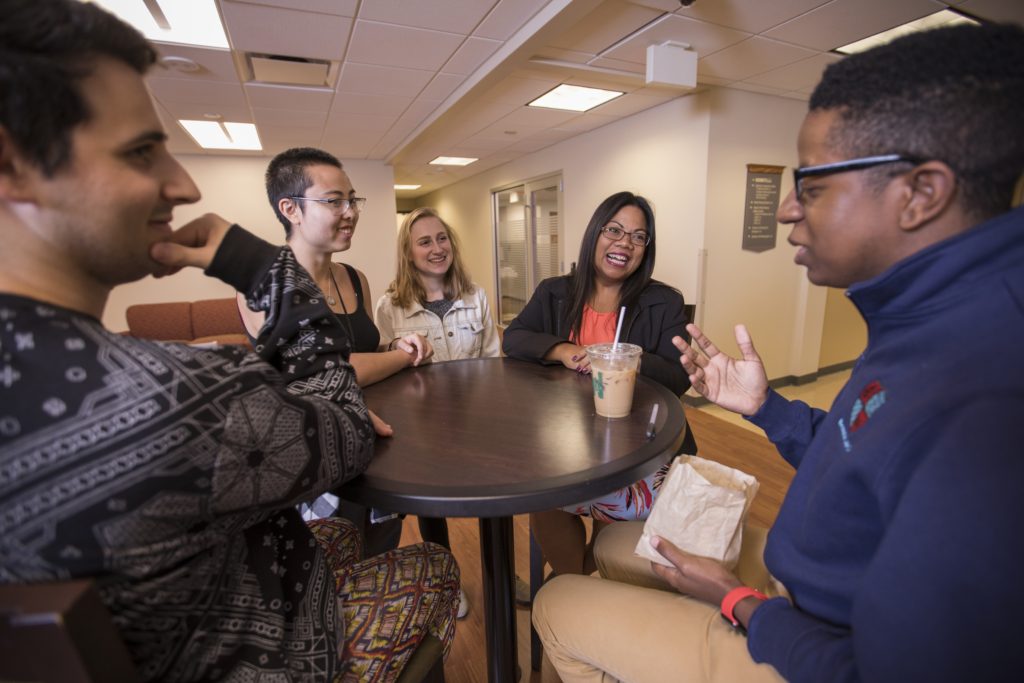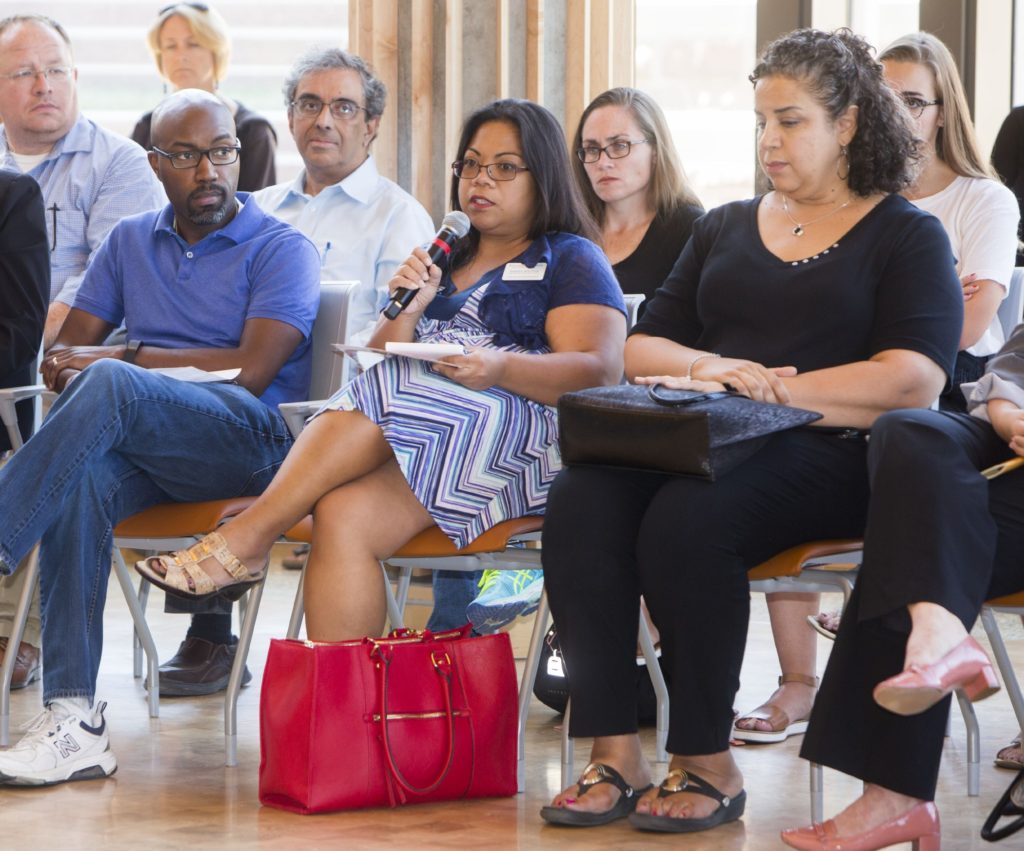
A not-guilty verdict in the Jason Stockley case.
An end to the Deferred Action for Childhood Arrivals program.
A controversial performer at WILD.
The Center for Diversity and Inclusion (CDI) at Washington University in St. Louis launched three years ago, in part, for moments like these. In the past month, students have converged at the CDI’s new office in the Danforth University Center to make sense of those issues. Some students want to protest; some need to vent; all seek solutions. Emelyn dela Peña, associate vice chancellor for student affairs and dean of the center, is there for them, providing resources and support — but never easy answers.
“We are most often called upon to respond, but capacity building and education are just as important,” dela Peña said. “We can’t dictate who plays WILD or tell student groups to mandate diversity training; we don’t want to. But we can give students the tools to have these hard conversations. And we can introduce our students to the scholarship behind the work that we do. Folks don’t always think about the theoretical underpinnings of the work that we do, including our students. But diversity is more than just a nice-to-have; it’s critical to the intellectual transformation of our students.”
To that end, the center has hosted numerous programs with leading academics, including David Cunningham, professor of sociology in Arts & Sciences, who discussed ways to address white supremacy on college campuses; and Odis Johnson, associate professor of education and of sociology in Arts & Sciences, who presented his research about police shootings. The CDI also sponsors the Java and Justice discussion group led by undergraduate interns and, next semester, dela Peña will serve as faculty adviser to a new three-credit course on race and ethnicity.
But on the day a judge found former St. Louis Police Officer Jason Stockley not guilty in the shooting death of Anthony Lamar Smith, students just wanted a place to be together.
“Students started drifting in, shocked, confused, angry,” dela Peña said. “They were glued to the television. We got them lunch and said, ‘OK, let’s turn this off and have a conversation.’”
Clayton Covington, a junior studying international and area studies and Latin American studies in Arts & Sciences, was there. He admitted that he was wary when the university hired dela Peña as an associate vice chancellor. Would an administrator so senior have time to talk one on one with students, he wondered.
“I’ve been pleasantly surprised,” Covington said. “She’s been very present. We know we have, in her, an advocate. But she recognizes the agency of students to make change for themselves.”
Covington objected to the selection of rapper Lil Dicky to play WILD, citing lyrics that he found racist and offensive. Student organizers promised to better vet artists and include more voices in the selection process. Covington appreciated the response, but organized with fellow students an alternative party in Bowles Plaza with a student DJ and dancing.
“The CDI provided us the space to meet and discuss these issues, but they didn’t tell us, as students, what we should or shouldn’t do,” Covington said. “The staff at the CDI has a very expansive view of the definition of activism. Personally, I feel like I’ve gone through a radical transformation of how I think about myself and the opportunities I have to impact change.”
Dela Peña went through that same transformation. She vividly remembers the first protest she attended as a high school sophomore in Los Angeles. The archdiocese wanted to shut down her school.
“It was a bunch of poor, brown women protesting a bunch of white men,” dela Peña said. “We saved the school, and it’s still there today.”

Dela Peña also remembers the protest she skipped. It was four years later, and her classmates at University of California, San Diego, invited her to block Interstate 5 to join their protest against the police beating of Rodney King. She chose to go to class instead.
“I was criticized by my friends,” dela Peña said. “But I remember making a very conscious choice: ‘I’m going to finish class. I’m going to finish college. And I’m going to come back and make a difference for people like me.’”
“I wasn’t going to let someone else dictate the form of my activism,” dela Peña said. “I may not have blocked the freeway, but I joined a lot of committees and met with administrators to advocate for students. In activism, there are the parts that are performative, that get on the news. But there is the part that is about the work. You may not be the one who got arrested, but who cleaned afterward or printed up the posters.”
To students who want to protest, dela Peña reminds them to be safe — travel in groups, tell someone where you are going. And to those students who don’t want to protest, she assures them there are many ways to build understanding and make a difference.
“Can you have a conversation with your roommate?” dela Peña said. “Can you interrupt a sexist joke? Can you be an upstander instead of a bystander? Can you ask good questions? Can you invite someone to lunch and listen to their story?”
Dela Peña arrived here after serving in a similar role at Harvard University. At first, she rejected Washington University recruiters. Then she had a conversation with Lori White, vice chancellor for student affairs.
“That’s what got me to leave Harvard — the level of commitment from the highest levels at this university to this mission,” dela Peña said. “I felt, ‘Yes I am making a difference at Harvard, but this is where I’m needed now.’”
The aftermath of Ferguson also propelled her here. She reminds students that St. Louis does not need parachute protesters but community members committed to understanding and service. Ultimately, she would like to see the CDI and university researchers study how the university has made an impact on the racial climate in St. Louis.
“There was an urgency with Ferguson to do this work on the campus and to think about our connection to the community,” dela Peña said. “It also sparked in me this idea around ‘If we can figure this out here, we could be a national model for what this work needs to look like in other places.’”
Comments and respectful dialogue are encouraged, but content will be moderated. Please, no personal attacks, obscenity or profanity, selling of commercial products, or endorsements of political candidates or positions. We reserve the right to remove any inappropriate comments. We also cannot address individual medical concerns or provide medical advice in this forum.